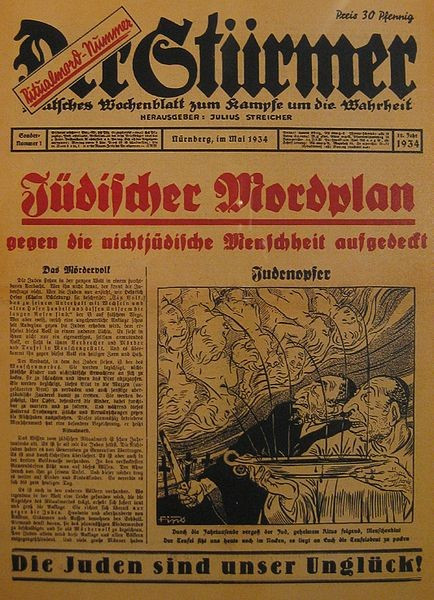Gerald Scarfe's Sunday Times Cartoon Anti-Semitic? You're Having a Laugh
Follow @shanecroucher
All great satirical cartoons are provocative, but not all provocative satirical cartoons are great.
Take Gerald Scarfe's latest scribble for the Sunday Times as an example. It has certainly provoked anger, with his depiction of Israeli prime minister Benjamin Netanyahu building a wall with stricken Palestinians amongst the bricks, their blood used as cement.
Underneath the wall sits a caption: "Israeli elections: Will cementing peace continue?"
The takeaway message is that the re-election of Netanyahu in Israel will mean a continuation of his government's policies towards Palestinian territories, one of which involves building an enormous wall at the West Bank's border.
Clearly Scarfe's view is that Israeli government policy towards Palestinians is one of murderous violence, of death and bloodshed, and he has represented this in a cartoon which grossly oversimplifies a painfully complex situation in that troubled part of the Middle East.
However, this has been taken as a hateful anti-semitic attack on all Jewish people. Not a political criticism of the Israeli government's policy, but a demonstration of anti-Jewish racism.

As a consequence, Scarfe has had serious accusations dropped on him like bombs in an airstrike.
He has faced a torrent of rage for allegedly committing 'blood libel', making an image akin to that seen in Nazi propaganda, and insensitivity for having it published on Holocaust Memorial Day.
All this, yet the cartoon is so clearly not aimed at Jews. It is - and I repeat this for the avoidance of any doubt - directed at Israel's government, or more specifically its political leader Netanyahu.
Even the Sunday Times, when responding to criticism, pointed out that this was was not targeting Jewish people.
"The Sunday Times firmly believes that it is not anti-semitic," said a spokesman for the Jewish Chronicle.
"It is aimed squarely at Mr Netanyahu and his policies, not at Israel, let alone at Jewish people. It appeared on Sunday because Mr Netanyahu won the Israeli election last week."

A bloody disgrace?
Accepting that the cartoon's target is politics, not race, leads to the inevitable conclusion that Scarfe was not anywhere near committing the offence known as blood libel.
Blood libels are representations of the vile anti-semitic myth that Jews use the blood of children in religious ceremonies and rituals, even cooking it into food.
It is a medieval belief, which perhaps explains why it is so common across sections of the Middle East, but is clearly not one being expressed in the yawnworthy cartoon.
There is no young child being slain by a revoltingly-caricatured Jew, with the blood being used in a warped religious ceremony.
While blood is used as the mortar in Netanyahu's wall, this is obviously portraying a not uncommon view that Palestinian blood is being spilt by the policies of Israel's government.
It is not a difficult distinction to understand.
Equally, Nazi propaganda attacked the Jews as a race - something Scarfe's cartoon evidently does not do at all.
Again, when you comprehend that this cartoon was not an attack on Jewish people, you can dismiss the claim that it is an insensitive thing to publish on Holocaust Memorial Day.
A parallel can be drawn with the Danish cartoons that depicted the Prophet Mohammed, published in 2006 in a competition held by Jyllands-Posten, which sparked riots, fatwas, and assassination attempts in a characteristically measured reaction from Islamists.
Of the 12 cartoons, the image which caused the most froth to foam in the mad mullahs' beards was one depicting Mohammed as having a bomb for a turban.
Much like Scarfe's cartoon, this is a juvenile portrayal of a political situation, not especially clever or witty, which would suit the wall of a sixth form common room more than a page in a supposedly serious publication.
And, much like with Scarfe's scrawl, it was incorrectly taken as a sweeping attack on a people, in this case every single follower of Islam. Sadly not just by the idiot clerics, but by Western leaders who masquerade as liberals, too.
Except it was not an attack on Islam. Anybody who can grasp nuance, which is apparently a dwindling number in the modern world of instant internet outrage, can comprehend that this was an attack on Islamism, a violent and tyrannical political interpretation of Islam which intelligently makes its argument by blowing people up and flying planes into buildings.
While the reaction to Scarfe has been much less extreme - there have been no fatalities yet - the censorial instinct is the same. Many, on the basis of a wrongful interpretation, would like to have seen Scarfe's cartoon censored.
In fairness to those acutely sensitive to anti-semitism, Holocaust Memorial Day sets an understandable emotional context, as the indescribable horror suffered by those who lived under the Nazis - many of whom are still alive and bearing the scars of genocide - is brought to the fore of everybody's mind.
More broadly, Israelis live in the centre of a region where neighbour states want to see them "wiped off the map" and where anti-semitism is the hallmark of populist politics.
For those of us in the West, the notion of a "Jewish conspiracy" is laughable, and confined to a world of paranoid keyboard warriors muttering on internet forums about the "truth" behind 9/11.
Here, this childlike view is held up to ridicule. In the Middle East, a Jewish conspiracy is the official line.
Still, even with that context in mind, it is clear as the Mediterranean Sea that this is not the starting point, or end destination, of Scarfe's cartoon. Those attacking it, and him, for anti-semitism are missing the point.
They should be debating the risible politics of the cartoon, rather than foisting an unconnected meaning onto it.
---
Shane Croucher is a business reporter for IBTimes UK.
---
Follow @shanecroucher
© Copyright IBTimes 2025. All rights reserved.






















